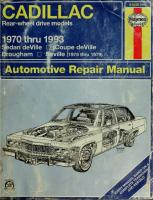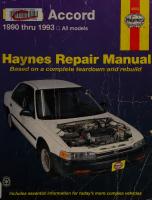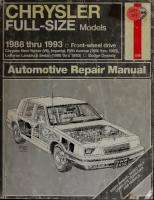Haynes Volvo 240 Series 1976 thru 1993 Automotive Repair Manual [8 ed.] 1563921367, 9781563921360
“"Models covered: all gasoline engine models 1976 through 1993." Previous ed. by J.H. Haynes and Bruce Gilmou
139 63 26MB
English Pages 324 Year 1998
Recommend Papers
![Haynes Volvo 240 Series 1976 thru 1993 Automotive Repair Manual [8 ed.]
1563921367, 9781563921360](https://ebin.pub/img/200x200/haynes-volvo-240-series-1976-thru-1993-automotive-repair-manual-8nbsped-1563921367-9781563921360.jpg)
- Author / Uploaded
- Robert Maddox
- John H. Haynes
- Similar Topics
- Technique
- Transportation: Cars, motorcycles
File loading please wait...
Citation preview
T
97020
(270)
240 Series 1976 thru 1993 All
gasoline engine models
Automotive Repair Manual
Digitized by the Internet Archive in
2011
http://www.archive.org/details/volvo240seriesau00madd
%
Volvo 240 Series Automotive
A B
Repair
Manual
A B
by Rob Maddox
and John H Haynes Member
of the Guild of Motoring Writers
Models covered: All
gasoline engine models
1976 through 1993 (3B3
-
97020) (270)
/urrCMCnvi?
ACCeSSOHI-L ASSOCIATION
Haynes Publishing Group Sparkford Nr Yeovil Somerset BA22 7JJ England Haynes North America, 861 Lawrence Drive
Newbury Park 91320 USA
California
Inc
^—
About Its
this
manual
purpose The purpose
of this
manual
is
to help
you get the best value from your vehicle. It can do so in several ways. It can help you decide what work must be done, even if you choose to have it done by a dealer service department or a repair shop; it provides information and procedures for routine mainteoffers diagnostic nance and servicing; and and repair procedures to follow when trouble it
occurs.
We
hope you use the manual
the work yourself. For
to tackle
many simpler
jobs,
doing it yourself may be quicker than arranging an appointment to get the vehicle into a
shop and making the trips to leave it and pick it up. More importantly, a lot of money can be saved by avoiding the expense the shop
must pass on to you to cover its labor and overhead costs. An added benefit is the sense of satisfaction and accomplishment that you feel after doing the job yourself.
Section 3 and Step
(or
paragraph) 2 within
that Section.
Procedures, once described are not normally repeated.
When
make
Using the manual The manual
is
Each Chapter is divided into numbered Secwhich are headed in bold type between horizontal lines. Each Section consists of consecutively numbered paragraphs. At the beginning of each numbered Section you will be referred to any illustrations which apply to the procedures in that Section. The reference numbers used in illustrations,
tion captions pinpoint the pertinent Section
and the Step within that Section. That illustration 3.2
means
be given as Chapter and Section number. Cross references given without use of the word ''Chapter" apply to Sections and/or paragraphs in the same Chapter. For example,
is,
the illustration refers to
"see Section 8"
means
in
the
same
seat, facing forward.
Even though we have prepared this manual with extreme care, neither the publisher nor the author can accept responsibility for any errors in, or omissions from, the information given.
will
CAUTION provides a special procedure or special steps which must be taken while completing the is found. Not heeding a Caution can result in damage to the assembly
procedure where the Caution being worked on.
WARNING provides a special procedure or special steps which must be taken while completing the is found. Not heeding a Warning can result in personal injury.
procedure where the Warning
Acknowledgements We are grateful to Volvo North America Corporation tions. Technical writers
©
who
for assistance with technical information
and
certain illustra-
contributed to this project include Larry Warren and Mike Stubblefield.
Haynes North America,
Inc.
1977, 1978, 1981, 1984, 1986, 1988, 1990, 1994, 1998
With permission from J.H. Haynes & Co. Ltd.
A book
in
the Haynes Automotive Repair Manual Series
Printed
in
the U.S.A.
reserved. No part of this book may be reproduced or transmitted in any form or by any means, electronic or mechanical, including photocopying, recording or by any information storage or retrieval system, without permission in writing from the copyright holder.
All rights
ISBN
1
56392 136 7
Library of
Congress Catalog Card Number 94-73496
While every attempt is made to ensure that the information in this manual is correct, no liability can be accepted by the authors or publishers for loss, damage or injury caused by any errors in, or omissions from, the information given.
99-320
Chapter.
References to the left or right side of the vehicle assume you are sitting in the driver's
provides information necessary to properly complete a procedure or information which
A Warning
neces-
will
divided into Chapters.
the procedure easier to understand.
A Caution
the text,
it's
sary to refer to another Chapter, the reference
NOTE A Note
in
0-3
Contents Introductory pages About this manual 240 Series numbers
Introduction to the Volvo
Vehicle identification Buying parts Maintenance techniques, tools and working
facilities
Jacking and towing Booster battery (jump) starting Automotive chemicals and lubricants Conversion factors Safety
first
Troubleshooting
Chapter
0-2 0-4 0-5 0-6 0-6 0-12 0-12 0-13 0-14 0-15 0-16
1
Tune-up and routine maintenance
Chapter 2
Part
1-1
A
Engines
Chapter 2
2A-1
2A
2B-1
2B
B
Part
General engine overhaul procedures
Chapter 3 Cooling, heating and
Chapter 4
Part
air
conditioning systems
Chapter 4
3-1
A
Fuel and exhaust systems
engines
-
fuel injected
-
carbureted engines
4A
4B-1
4B
Chapter 5 Engine
electrical
systems
5-1
5
6-1
6
Chapter 6 Emissions and engine control systems
Part A Manual transmission
Chapter 7
Chapter 7
Part
7A-1
7A
7B-1
7B
B
Automatic transmission
Chapter 8 Clutch and driveline
8-1
8
9-1
9
Chapter 9 Brakes
Chapter 10 Suspension and steering systems
3
4A-1
B
Part
Fuel and exhaust systems
1
10-1
10
11-1
11
12-1
12
Chapter 11 Body
Chapter 12 Chassis
electrical
system
Wiring diagrams
12-19
Index
IND-1
IND
0-4
1981 model Volvo 245GL
Wagon
1988 model Volvo 240GL Sedan
Introduction to the Volvo 240 Series These models are available in 2- and 4door sedan and station wagon body styles. They are powered by single overhead cam inline four-cylinder engines. These engines feature carburetors on certain models and
tination.
mechanical or electronic fuel injection systems on others, depending on year and des-
solid rear axle
Transmissions are a five-speed
manual and three-speed automatic and some models are equipped with overdrive. The transmission is mounted to the back of the engine, and power is transmitted to the by a two-piece driveshaft. Power-assisted front and rear disc
brakes are standard equipment. The front suspension is MacPherson strut design, with the coil spring/shock absorber unit making up the upper suspension link. The rear suspension is made up of coil springs and conventional design shock absorbers with trailing
arms and a track bar
locating the axle.
0-5
Vehicle identification Vehicle Identification
Number
The Vehicle Identification Number (VIN) is located on the cowl in the engine compartment, on the passenger's side door pillar, and. on US and Canadian models, on a plate on top of the dash, just inside the windshield (see illustrations).
contains valuable infor-
It
numbers
mation such as where and when the vehicle was manufactured, the model year and the body style. This number can be used to cross-check the registration and license. On later models the number is etched on the glass and affixed to most body parts in
Engine
serial
The engine the
left
Vehicle identification plates (early models)
and model year designation
Type designation, serial number and part number of engine Type designation, sehal number and part number of
Final drive reduction ratio, part
transmission
of rear axle
in
Final drive reduction ratio, part
located on
Vehicle identification plates (later models)
front fender
code number for color and engine compartment inside right
Vehicle type designations, plate
is
(see illustration).
Type Type Type Type
-
number
side of the block, toward the front
accordance with federal law.
Type and model year designation and chassis number upholstery
number
serial
number and serial number of
designation,
designation, serial
number of engine number and part number of
transmission
Service plate (sedan) or
rear axle
maximum permitted load and color code
designation and part
in
-
number and serial number
below the rear window on the right side compartment (wagon)
the large storage
VOLVO
i
In
_l
* H'M 'i'i'i
'
"
addition to vehicle type designation plate, on US and Canadian Identification Number is located on the left
models the Vehicle
side of the dash, at the base of the windshield (later models) or
along the windshield
pillar (early
models)
The engine serial number is stamped on the left side of the cylinder block. The last three digits of the engine part number are displayed on a decal on the timing belt cover
0-6
Buying parts Replacement parts are available from sources, which generally fall into one of
many
two categories - authorized dealer parts departments and independent retail auto parts stores. Our advice concerning these is as follows: Retail auto parts stores: Good auto parts stores will stock frequently needed components which wear out relatively fast,
parts
such as clutch components, exhaust systems, brake parts, tune-up parts, etc. These stores often supply
new
or reconditioned
parts on an
exchange
basis,
amount
unique to the vehicle and not generally available elsewhere (such as major engine parts, transmission parts, trim pieces, etc.). Warranty information: If the vehicle is still covered under warranty, be sure that any replacement parts purchased - regardless of the source - do not invalidate the warranty! To be sure of obtaining the correct parts, have engine and chassis numbers available and, if possible, take the old parts along for positive identification.
which can save
money. Discount auto parts stores are often very good places to buy materials and parts needed for general vehicle maintenance such as oil, grease, filters, spark plugs, belts, touch-up paint, bulbs, etc. They also usually sell tools and a considerable
of
general accessories, have convenient hours,
charge lower prices and can often be found not far from home. Authorized dealer parts department: This is the best source for parts which are
Maintenance techniques, tools and working facilities Maintenance techniques
Most automotive machine shops can perform
removed from an assembly, should always
There are a number of techniques involved in maintenance and repair that will be referred to throughout this manual. Application of these techniques will enable the home mechanic to be more efficient, better organized and capable of performing the various tasks properly, which will ensure that the repair job is thorough and complete.
this task,
as well as other repair procedures, such as the repair of threaded holes that
damaged washers
have been stripped Flat
be replaced exactly as removed. Replace any with new ones. Never use a lockwasher on any soft metal surface (such
out.
washers and lockwashers, when
'*%
^r%
Fasteners Fasteners are nuts, bolts, studs and screws used to hold two or more parts together. There are a few things to keep in mind when working with fasteners. Almost all of them use a locking device of some type,
Grade
1
as aluminum), thin sheet metal or
Grade 5
or 2
plastic.




![Haynes Hyundai Excel 1986 thru 1993 Automotive Repair Manual [1552]
1563920638, 9781563920639](https://ebin.pub/img/200x200/haynes-hyundai-excel-1986-thru-1993-automotive-repair-manual-1552-1563920638-9781563920639.jpg)




